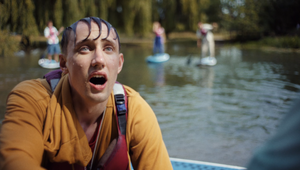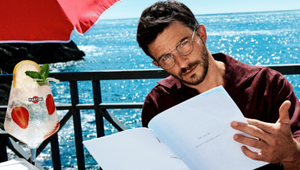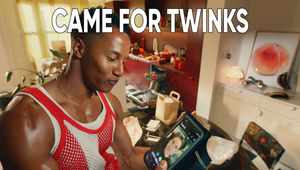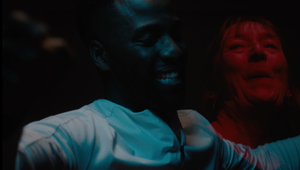
How Florence Winter Hill Finds ‘Humour in the Mundane’

Florence Winter Hill, a director at Missing Link Films and The Agency London, describes herself as a ‘quiet’ filmmaker - in every way. Not only is she super intentional with her usage of music, but she is also fond of a more subdued sense of humour. Or, the one we can find in the mundane. She explains that she is particularly in touch with her British awkwardness, which informs a lot of her directing choices when she does comedy, which can be seen in pieces such as ‘The Gospel According to Gail’, a short about a driving instructor and her student running over a cat (among other things).
Her commercial work doesn’t stray far from her film and TV projects either, with some of her work for Philadelphia and Asda striking audiences with their uncomfortable humour. Staying loyal to her penchant for comedic content, Flo is also keen on talking about harder subjects, but in a funny way. Again, influenced by the ‘British way’ of doing things, she tends to address more serious topics by smoothing their edges with humour.
Florence also describes herself as a total film buff, encouraging all young aspiring directors to do the same and ‘watch everything’, which was one of the first and best pieces of advice she received at the beginning of her directing journey. Not only that, but because her work is so human, she believes that understanding acting is vital to delivering a natural expression of her comedy.
When writing for a British audience she says, “We’re sarcastic, cringeworthy, miserable, embarrassing, we understate everything, love irony and most of us are completely socially inept.” Internalising all of these aspects of the humour that has raised her is what makes her projects, regardless if they are ads or films, hit much closer to home.
To discuss all of this and more, LBB’s Zoe Antonov spoke to Florence about her unique style and why human stories are the funniest ones to tell.
LBB> Florence, tell us more about your start in film. Have you always been drawn to it or was it more of a happy accident?
Florence> I’ve always been making up some kind of story, and filming everything on any camera. It was always something I was drawn to, and I followed it everywhere I could. I’d put on plays with friends in my parents’ living room, I’d make sock puppet videos and film full blown sketch shows with my neighbours and a camcorder. I told scary stories to my entire class in primary school and scared so many kids, I’d bring them to tears (whoops)… I quickly realised actually making people laugh is a bit more fun, and that it’s always been something I loved (whether I meant to make people laugh or not). Though I still seem to make children cry.
People used to say I had to watch my ‘nervous laughter’ as an anxious teenager. I used to be conscious of it when I was young, and I did laugh ALL the time. But my nervous laughter became something I actually just loved, and couldn’t help, because I was really damn funny... I'm happiest when I’m with a group of people who have a great sense of humour, and we are all just making each other laugh. I’m not as anxious anymore, but I do want to laugh all the time. And I love seeing other people laugh too. So, I feel like I’ve dedicated my life and my art to it. That’s really all I want to do.
LBB> What have been your biggest influences earlier in your career and how did they change the way you direct?
Florence> I’ve always loved all kinds of comedy, but I think I spent a long time looking for something that felt familiar to who I am, and something I could see myself wanting to make one day… I grew up with ‘Black Books’ and ‘Spaced’ being my favourite shows. When I got to my late teens, I started watching a lot of French New Wave films (like ‘Une Femme Est Une Femme’) which I loved the style of, and was a wonderful discovery, considering I hadn’t been exposed to anything like it before with film. Then I started watching Chaplin, Buster Keaton… I saw ‘Sherlock Jr’ and I thought it was the funniest thing I’d ever seen. At some point, I discovered Jacques Tati’s films. ‘Playtime’, ‘Mon Oncle’, ‘Jour De Fete’ - I saw these when I was around 18 and I completely fell in love, and I was SO excited by the idea of ‘humour in the mundane’. It felt completely me.
I then discovered mumblecore comedy films, specifically starting with Frances Ha and ‘Appropriate Behaviour’ (as a young queer gal this was a huge moment for me) - and my eyes became hearts, again. I’ve always been really fascinated by people, and I think people just existing and talking is hilarious and brilliant. It sounds so simple, but it’s really my passion - the funny in the mundane. Noah Baumbach’s work has been a huge influence, such incredible characters and realistic performances in seemingly everyday scenarios in their lives - literally DELICIOUS. On the other end of the spectrum, sketch comedy has a huge place in my heart. Key and Peele is chef’s kiss and will make me happy on the saddest days.

Still from Philadeplhia
LBB> If you have to describe your style in three words, what would they be and why?
Florence> Funny, stunning, immensely likeable… Also how I’d describe myself.
Haha, ok, that’s what I hope for…
Endearing, characterful, quiet. Endearing because I really care about character, and great performances. Even if they’re weird or off-beat, I want audiences to really connect and care about the people, to understand and relate to them. Characterful because every character who exists on screen, I’ve added a weird amount of detail and backstory with the actors to give them as much depth as possible.
Quiet kinda surprised me when I wrote that down, but I think it’s because you see a lot of comedy that uses sound and effects as sort of part of the language of humour, but for me I really just like the simplicity of great performances and the writing being hilarious. A lot of the time, I think the quieter the funnier. Maybe that’s the awkward Brit in me.
LBB> When it comes to directing satirical films in the UK, what are the nuances of British humour you take into consideration? Can you give me an example with your work?
Florence> I think my sense of humour is very naturally British. We’re sarcastic, cringeworthy, miserable, embarrassing, we understate everything, love irony, most of us are completely socially inept… I take these nuances into account with my work quite organically considering I am also all of these things.
I do really love our sense of humour, and I think we deal with a lot of painful things through humour and laughing. Which I love, but it’s also quite hard to watch sometimes. I definitely flung myself into that with ‘If You Go’, which I wrote and directed from my own experience when my mum was going through chemotherapy for breast cancer when I was a teenager. In the film, the mother can’t accept the seriousness of the cancer, and therefore how it’s affecting the people around her, so she consistently shrugs it off as nothing, as a way of making it feel easier to her. But by doing so, she doesn’t see that her daughter is turning down a huge opportunity to follow her dream, in the hope of staying to look after her. I think it’s an honest depiction of how we deal with pain sometimes; humour makes things easier, and softens the harsh edges of reality. I wanted to study the effects of that in ‘If You Go’.
In ‘The Gospel According To Gail’ though, Gail is just a chaotic walking disaster, whose small town problems and dramas are on the same level to her as someone in the Mafia. So, British humour is very nuanced and special and I love it.
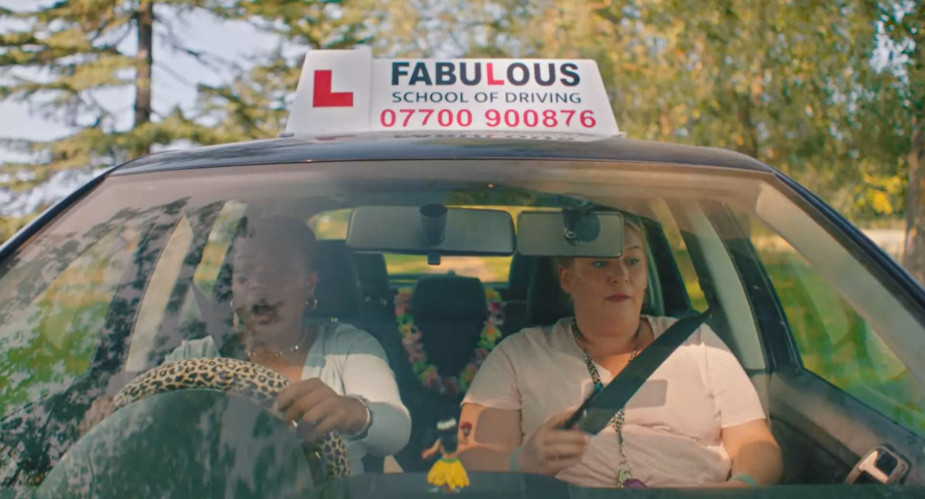
Still from 'The Gospel According to Gail'
LBB> Talk to me more about 'The Gospel According to Gail' and especially its brilliant casting and script. I was truly amazed at the flow of the monologues and conversations. How did you achieve that and what is the key to natural scripts?
Florence> First of all, thank you so much. The script for ‘Gail’ was written by the amazing Celia Legard and Amaya Owen Rowlands. I was immediately drawn to it because of the naturalism in their writing.
I’m really obsessed with character and performance and I’m very picky about what I think works, especially in terms of what is and isn’t funny. I love subtlety, and most of getting subtle comedy comes from knowing your characters inside out, and developing that background detail with the actors and writers beforehand. I write a weird amount of detail into the background lives of any character I’m working with in a script. I want to feel like I know them personally and have known them my whole life. It helps me, but also the actor, create a realistic performance that is based on who this person is and how their brain works. For me, it’s really all about the ‘why’ - creating a thought, or a collection of thoughts, in the character, resulting in the performance you need.
Another key is rehearsal. I always want to rehearse, even before the actors I want to read the lines with someone so I myself can feel the flow as the words come out of my mouth. It gives us the opportunity and flexibility to change and adapt come the rehearsal with the actors, and then same again before we shoot.
LBB> Tell us about the usage of music when it comes to comedy - how do the two interact and what should be always considered when mixing them?
Florence> I’m quite a quiet filmmaker I think. Generally speaking, I like to watch films that have a focus on performance and naturalism, so I like to keep music purposeful to the scenes.
For example, if it’s on in the background at someone’s house, or in the background at a bar. It’s interesting with my commercial work, more recently I have been using music as a score - for example in Lemsip and Philadelphia. Philadelphia was more for dramatic purposes, and I really loved that idea from the beginning. It felt like a sketch to me, we’re very much in his world, in his moment, as he’s reeling off a huge monologue about his sensual experience with cream cheese. It’s completely right for the tone, ridiculous, pushed, dramatic - and different to what I’m used to in my film work. I think music is a great comedic tool, but, like anything - I like to use it only when it 100% supports and uplifts the story being told!
LBB> What are some trends in comedy ads and films you see today? Are you fond of some of them? And on the flip side, do you dislike some?
Florence> I am really loving that more work is taking the piss out of the rich.
And that more commercial work is being more honest, self-referential and in touch with audiences' satirical views on things. It works, it makes sense, it’s relatable, it’s funny… I’m gen z, and I think we all get what advertising has tried to do in the past, and we understand capitalism, and we’re bored of being lied to. Honesty is funny. Being on the audience's level is funny. I think it works, and I think it should stay.

Still from Asda
LBB> If you had to give some piece of advice to people who want to pursue comedy in their directing, what would that advice be?
Florence> The best advice I have ever been told was from Ringan Ledwidge when I was 14 years old. I was, very luckily, doing work experience at Rattling Stick. He was the most lovely man and always made time for me, even though I was a literal baby in the office. I once asked him what advice he would give me as a young aspiring director, and he told me: ‘Become a film buff. Watch everything’. And so I did, and I am. It’s the only way I’ve worked out what I really love, what I don’t like, what I like but wouldn’t make myself… I’ve learnt so much about myself and my filmmaking through just watching lots and lots and lots of films, TV, commercials, everything. I’ll be forever grateful to him for that. So I advise everyone else the same, watch everything!
Also, learn everything you can about acting and performance, for me that's the key. If you can create great performances with actors who have naturally funny bones, you’re already halfway there.









